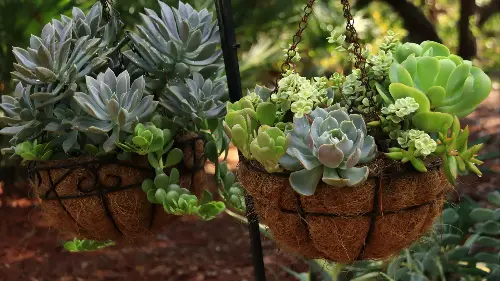
One of the best things about houseplants is they don't have to be restricted to indoors. At different points in the year, it's possible to place your indoor plants outdoors to soak up some sunshine and fresh air.
For example, many of the best indoor succulents can be grown outdoors during the warmer months. Of course, specific types of succulents will be hardy to specific US hardiness zones, but even cooler climates can host some succulents outdoors. However, the colder months bring another challenge to consider - frost.
Whether you're planning to landscape with succulents and cacti or simply want to know where to place your potted succulents for winter, it's important to understand if succulents survive frost. Here, experts share everything you need to know.
Can succulents survive frost?
The short answer is no. Generally speaking, succulents cannot survive frost. However, this doesn't mean they can't cope with colder temperatures, as many succulents are actually cold-tolerant houseplants.
'While most succulents may prefer warmer climates, many do just fine in zones as low as four or five,' says garden expert, Jeremy Yamaguchi, from Lawn Love. 'Agave, for example, prefers Mediterranean climates, but they are cold-hardy, surviving in US hardiness zone five to zone nine,' he adds.
Other hardy succulents include sedum, euphorbias, and sempervivum, and they often tolerate as low as -20ºF. However, frost can cause detrimental damage to the long-term health of succulents.
'Cold temperatures below freezing can damage succulents or kill them by causing their cells to rupture,' explains plant nursery expert Tammy Sons.
Not only will freezing temperatures cause problems for succulent health, it also hinders their growing environment.
'They require dry and loose soil with good drainage to survive the winter because of their shallow roots,' Jeremy explains. This means your succulents are likely to struggle in hard and compacted soil if you haven't taken precautions to stop soil freezing in winter.
How to protect succulents from frost
Now that you have more of an understanding about whether succulents survive frost, it's important to turn your attention to how to care for succulents in winter. More specifically, how to ensure they don't become damaged by frost.
'In order to protect succulents from frost, they should be moved indoors into some type of shelter, or covered with a frost cloth,' Tammy advises.
The easiest solution to protecting succulents from frost is moving them indoors, as Tammy notes. This is a task to add to your overwintering a garden checklist.
However, if you have succulents that are tricky to move, you can use some methods to protect plants from frost for your succulents.
For example, use these frost cloths from Amazon. Alternatively, try these cloches from Walmart. There are also plenty of DIY solutions, like using bed sheets to protect plants from frost.
Of course, the most important thing to do is research the lowest temperatures the succulents you're growing can withstand and act accordingly to ensure they get through winter unharmed.
FAQs
Can you revive a succulent from frost damage?
If your succulent has been damaged by frost, it is likely to have limp and yellowing foliage. Depending on the severity of the damage, it is possible to make a dying succulent thrive again. You'll need essential pruning tools, like these pruning snips from Amazon, to cut away any damaged foliage. You should then bring your succulent indoors to prevent further exposure to frost and allow its soil to dry out entirely. Going forward, provide optimal care for your succulent to help it bounce back.
As well as providing your succulents with shelter in winter, make sure to reduce watering. You should only water succulents when their soil has dried out completely. In winter, this may only be as often as every three to four weeks.
